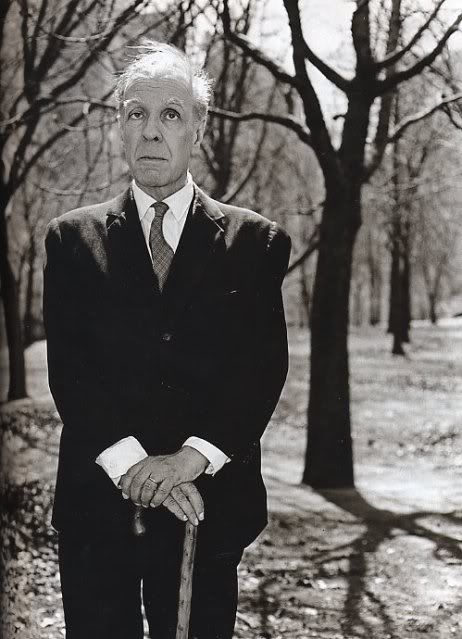
Jorge Luis Borges (photo by Diane Arbus)
Some of Jorge Luis Borges’s stories seem to be mined from that deep dream filled gap between being awake and being asleep. It’s a magical space: vivid events occur that are at once as real as they are impossible. If the sleeper wakes, sometimes the impossibilities are revealed. And then there’s wondering: how could anything that defies physical reality appear to be so real.
In “The Disk,” a story from The Book of Sand (El Libro de Arena)(1975), the impossible object is the “disk of Odin”:
“It is the disk of Odin,” the old man said in a patient voice, as though he were speaking to a child. “It has but one side. There is not another thing on earh that has but one side. So long as I hold it in my hand I shall be king.”
Ordinarily, objects are in three dimensions. Here one appears that has only a single side. Of course, it would be more or less invisible. And physically impossible on earth.
This, of course, is not entirely correct. The Moebius strip, discovered in 1858, has only one side and one boundary component. But that’s not important to the story.
The person with the disk eventually “opened his hand, and [the narrator] saw the gleam of the disk in the air.” But when he returned to where the disk was released, he couldn’t find it. And he’s been looking for it for years. In other words, the disk of Odin vanishes like a dream.
This kind of impossibility sometimes possesses far larger objects.

Italo Calvino
Italo Calvino tells us of this “Invisible City”:
When you have forded the river, when you have crossed the mountain pass, you suddenly find before you the city of Moriana, its alabaster gates transparent in the sunlight, its coral columns supporting pediments encrusted with serpentine, its villas all of glass like aquariums where the shadows of dancing girls with silvery scales swim beneath the Medusa-shaped chandeliers. If this is not your first journey, you already know that cities like this have an obverse: you have only to walk a semi-circle and you will come into view of Moriana’s hidden face, an expanse of rusting sheet metal, sack cloths, planks bristling with spikes, pipes black with soot, piles of tins, behind walls with fading signs, frames of staved-in straw chairs, ropes good only for hanging oneself from a rotten beam.
From one part to the other, the city seems to continue, in perspective, multiplying its repertory of images: but instead it has no thickness, it consists only of a face and an obverse, like a sheet of paper, with a figure on either side, which can neither be separated nor look at each other.
Alas, the city is a two dimensional solid, another escapee from the chasm between waking and dreaming.
In the moments between sleep and wakefulness these objects seem tangible to me. The city is flat, but it’s a city. The disk glimmers. I know I’m dreaming, but I try to remember to hold onto the dream so that I will be able to examine it more fully when I am awake. But as I awake, as my sleep falls away, the fallacy arises, and the object I am clenching so tightly in my fist, disappears. What was it? I wonder, how could that be? What was that? But it’s gone.
All of this is so reminiscent of the Lankavatara Sutra, “Things are not as they appear, nor are they otherwise.”
Which brings me ever so reluctantly to the elusive dream of a national, single payer health care system. In the dream, I am drinking rum and playing dominoes. Somehow, my empty glass falls off the table, lands on the cement walkway, and shatters. Somehow, probably because of the drinking and the kidding around, I cut my hand deeply on the glass when I try to pick up the shards. My hand hurts and it is bleeding badly. My friends are surprised that there’s so much blood, so they wrap my hand in a bandage, and we head on foot for the emergency room which is luckily only two blocks away. When we enter, a man sitting at a desk says to me and my friends, “I see you’ve cut your hand. Please come with me so we can take care of it.” And then, mirabile dictu, he does. Just like that. I’m out of the hospital in 20 minutes with 3 stitches and a nice, white bandage. It seems strange to me. Nobody asks me questions about insurance or citizenship. They don’t ask me to pay for anything. When I wake up, I realize it was a dream. It was impossible. I must have been in Cuba.
—————
cross-posted from The Dream Antilles

 Every so often I find there is a series of stories which just aren’t likely to get their own diary…even though they very well may deserve one. Time is a limited quantity after all and it’s about to become a much more limited quantity quickly, what with the new semester about to run us over. Syllabi are due next Thursday and classes start the following week.
Every so often I find there is a series of stories which just aren’t likely to get their own diary…even though they very well may deserve one. Time is a limited quantity after all and it’s about to become a much more limited quantity quickly, what with the new semester about to run us over. Syllabi are due next Thursday and classes start the following week.

